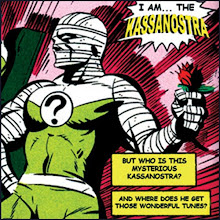 The first camp song I ever learned was Eddie Koochie-Kachie-Kama. The second camp song I learned was The Cat Came Back. (I know, I know. . . and yet somehow, years later, I don't detest music at all.) The third camp song I learned was Bread & Roses, except by "learned," I mean "had jack-hammered into my brain." It was our group's contribution to a camp-wide cultural event -- we were pretty young, and most of us were hearing the song for the first time, and I guess our staff wanted to make sure we had it solid. So they drilled it into us. We rehearsed it a bunch of times. We got the standard apocryphal history lesson on the Lawrence strike. We even went over some of the vocabulary (I definitely remember having trouble visualizing the "sudden sun" disclosing). Anyway, we learned it proper. And to this day, it's still one of my all-time K-Land faves.
The first camp song I ever learned was Eddie Koochie-Kachie-Kama. The second camp song I learned was The Cat Came Back. (I know, I know. . . and yet somehow, years later, I don't detest music at all.) The third camp song I learned was Bread & Roses, except by "learned," I mean "had jack-hammered into my brain." It was our group's contribution to a camp-wide cultural event -- we were pretty young, and most of us were hearing the song for the first time, and I guess our staff wanted to make sure we had it solid. So they drilled it into us. We rehearsed it a bunch of times. We got the standard apocryphal history lesson on the Lawrence strike. We even went over some of the vocabulary (I definitely remember having trouble visualizing the "sudden sun" disclosing). Anyway, we learned it proper. And to this day, it's still one of my all-time K-Land faves.So no problem, right? I loves me some bread and I loves me some roses and I seem to have a pretty good handle on why I dig it so much. Except that repeated camp music sessions over the years have left me predisposed to only like that version of the song. Any deviation from that perfect "gentle ballad" model unnerves the hell out of me. Even worse, that version isn't based on a standard (folksinger Mimi Fariña wrote the melody in the mid 1970s but never recorded a studio version herself) as much as it is a reflection of my own imbalanced mania. Judy Collins and John Denver have each recorded it; both artists swap out its understated elegance with a blaring triumphalism that makes it sound tacky. Ani DiFranco and Utah Phillips do an unfortunate version that includes a backbeat? Really? And don't even get me started on all the choral arrangements floating around out there.
The point here (besides that I can be a total ass about stuff like this) is that it would be great to have a studio recording of Bread & Roses that hews a little closer to the spirit of how we sing it in Tolland. I would absolutely love a cover version by Marla Hansen or Gillian Welch or Thao Nguyen, all of who employ a very restrained performance style without sacrificing an iota of character or potency. Or a new interpretation by a veteran singer who can bring her own history to the song without overwhelming it -- maybe Bettye LaVette, or Sally Timms of the Mekons.
 Until then, I give you an a cappella duet by Mimi Fariña and older sister Joan Baez. Not sure if this is exactly what I'm looking for, but I definitely prefer the stripped-down approach. And it goes without saying that their voices are amazing. As far as I know, this is the only recorded version of Fariña singing Bread & Roses. From a compilation album in support of her Bread & Roses charity, which sponsors musical performances in hospitals, nursing homes and prisons.
Until then, I give you an a cappella duet by Mimi Fariña and older sister Joan Baez. Not sure if this is exactly what I'm looking for, but I definitely prefer the stripped-down approach. And it goes without saying that their voices are amazing. As far as I know, this is the only recorded version of Fariña singing Bread & Roses. From a compilation album in support of her Bread & Roses charity, which sponsors musical performances in hospitals, nursing homes and prisons.Joan Baez and Mimi Fariña: Bread & Roses


No comments:
Post a Comment